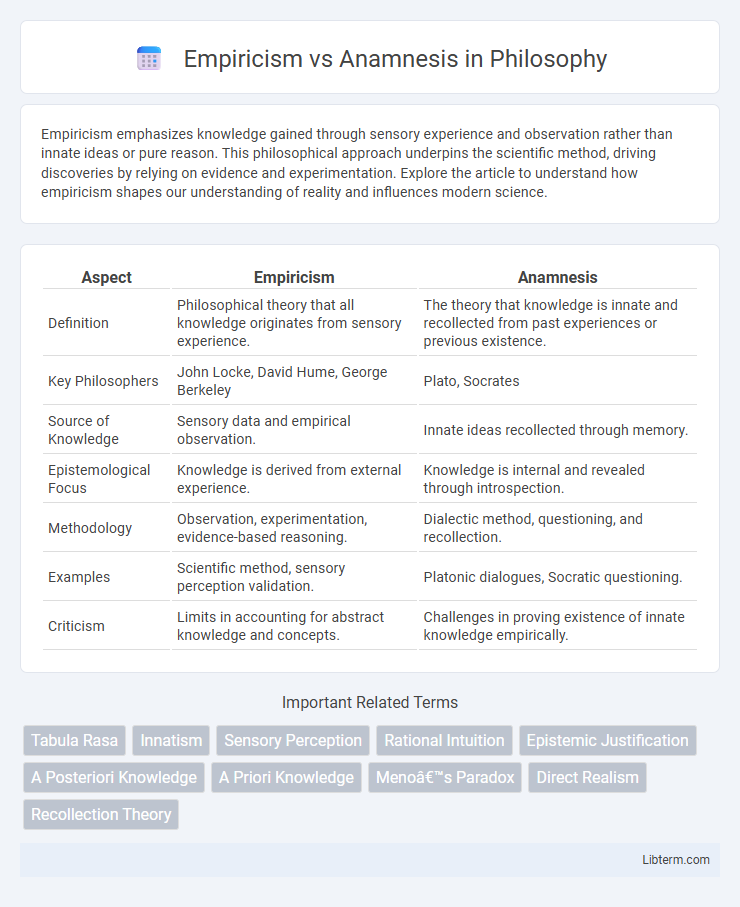Empiricism emphasizes knowledge gained through sensory experience and observation rather than innate ideas or pure reason. This philosophical approach underpins the scientific method, driving discoveries by relying on evidence and experimentation. Explore the article to understand how empiricism shapes our understanding of reality and influences modern science.
Table of Comparison
| Aspect | Empiricism | Anamnesis |
|---|---|---|
| Definition | Philosophical theory that all knowledge originates from sensory experience. | The theory that knowledge is innate and recollected from past experiences or previous existence. |
| Key Philosophers | John Locke, David Hume, George Berkeley | Plato, Socrates |
| Source of Knowledge | Sensory data and empirical observation. | Innate ideas recollected through memory. |
| Epistemological Focus | Knowledge is derived from external experience. | Knowledge is internal and revealed through introspection. |
| Methodology | Observation, experimentation, evidence-based reasoning. | Dialectic method, questioning, and recollection. |
| Examples | Scientific method, sensory perception validation. | Platonic dialogues, Socratic questioning. |
| Criticism | Limits in accounting for abstract knowledge and concepts. | Challenges in proving existence of innate knowledge empirically. |
Introduction to Empiricism and Anamnesis
Empiricism emphasizes knowledge acquisition through sensory experience and observation, asserting that understanding originates from empirical evidence and experimental data. Anamnesis, rooted in Platonic philosophy, proposes that knowledge is innate and recollected from past experiences of the soul, suggesting memory precedes sensory input. These contrasting epistemologies highlight experiential learning versus inherent knowledge in the study of cognition and philosophy.
Historical Roots of Empiricism
Empiricism traces its origins to ancient Greek philosophy, particularly the works of Aristotle, who emphasized observation and experience as the foundations of knowledge. The tradition further developed during the Renaissance and Enlightenment with thinkers like John Locke and David Hume advocating sensory experience as the primary source of ideas. Empiricism contrasts with anamnesis, a theory rooted in Plato's philosophy, which argues that knowledge is innate and recollected rather than obtained through sensory experience.
Origins and Philosophy of Anamnesis
Anamnesis, rooted in Platonic philosophy, posits that knowledge is innate and recollected from previous existence, emphasizing the soul's pre-birth experiences as the origin of understanding. This theory contrasts with empiricism, which asserts knowledge derives solely from sensory experience and observation. Anamnesis prioritizes introspective insight and rationalism, highlighting memory as the key to accessing eternal truths beyond empirical evidence.
Key Thinkers: Empiricism vs Anamnesis
Empiricism, championed by John Locke and David Hume, argues that knowledge arises primarily from sensory experience and observation, emphasizing empirical evidence as the foundation of understanding. In contrast, Anamnesis, rooted in the philosophy of Plato, posits that knowledge is innate and can be recollected through introspection and rational insight, highlighting the soul's pre-existing awareness of universal truths. These opposing views shape foundational debates in epistemology concerning the origin and nature of human knowledge.
Methodologies: Observation vs Memory
Empiricism relies heavily on sensory observation and experimental evidence as the primary methodologies for acquiring knowledge, emphasizing data gathered from the external environment. In contrast, Anamnesis centers on the recollection of innate knowledge through memory, positing that understanding emerges from internal cognitive processes rather than empirical data. These divergent approaches highlight the fundamental epistemological debate between external sensory experience and internal mental recollection.
Epistemological Differences
Empiricism asserts that knowledge originates from sensory experience and empirical evidence, emphasizing observation and experimentation as the primary sources of understanding. Anamnesis, rooted in Platonic philosophy, posits that knowledge is innate and recollected from past experiences of the soul rather than acquired through sensory input. The epistemological difference lies in empiricism's reliance on external data for knowledge acquisition, contrasting with anamnesis's belief in internal reminiscence as the foundation of true knowledge.
Strengths and Limitations of Empiricism
Empiricism, grounded in sensory experience and observation, excels in producing verifiable and replicable knowledge through scientific methods. Its strengths lie in its reliance on empirical data, fostering objective and testable conclusions that advance technology and medicine. However, empiricism is limited by its dependence on sensory inputs, often struggling to address abstract concepts or innate knowledge that cannot be directly observed or measured.
Strengths and Limitations of Anamnesis
Anamnesis, rooted in Platonic philosophy, emphasizes knowledge as innate and recollected from past experiences, providing a powerful framework for understanding intuitive reasoning and deeper cognitive processes beyond empirical observation. Its strength lies in explaining how individuals access latent knowledge that cannot be acquired through sensory experience alone, supporting the notion of universal truths within the mind. However, anamnesis faces limitations due to its reliance on metaphysical assumptions and the difficulty of empirically verifying the existence of inherent knowledge, contrasting with empiricism's dependence on observable, testable evidence.
Contemporary Applications and Debates
Empiricism, emphasizing knowledge through sensory experience, dominates contemporary scientific research methodologies and evidence-based practices in fields such as psychology and medicine. Anamnesis, rooted in Platonic philosophy, inspires certain therapeutic approaches and epistemological debates about innate knowledge and memory retrieval in cognitive science. Current discourse explores the integration of empirical data with anamnetic insights, particularly in understanding consciousness and memory reconstruction mechanisms.
Conclusion: Bridging Empiricism and Anamnesis
Empiricism relies on sensory experience as the foundation of knowledge, while anamnesis posits that knowledge is innate and recollected through introspection. Bridging empiricism and anamnesis involves recognizing the complementary roles of external observation and internal insight in understanding truth. Integrating these approaches fosters a more holistic epistemology that values both empirical data and inherent cognitive structures.
Empiricism Infographic

 libterm.com
libterm.com